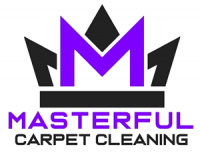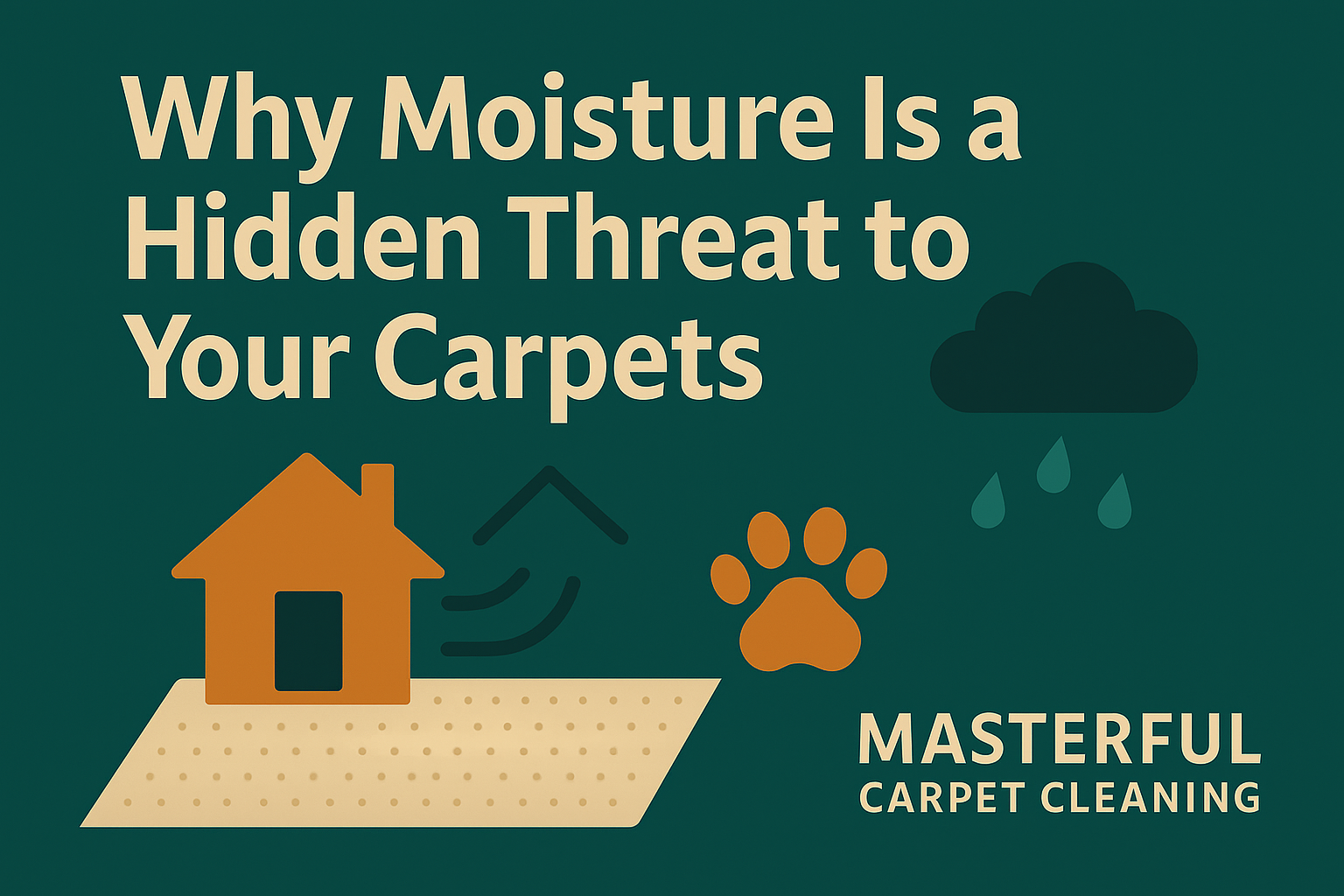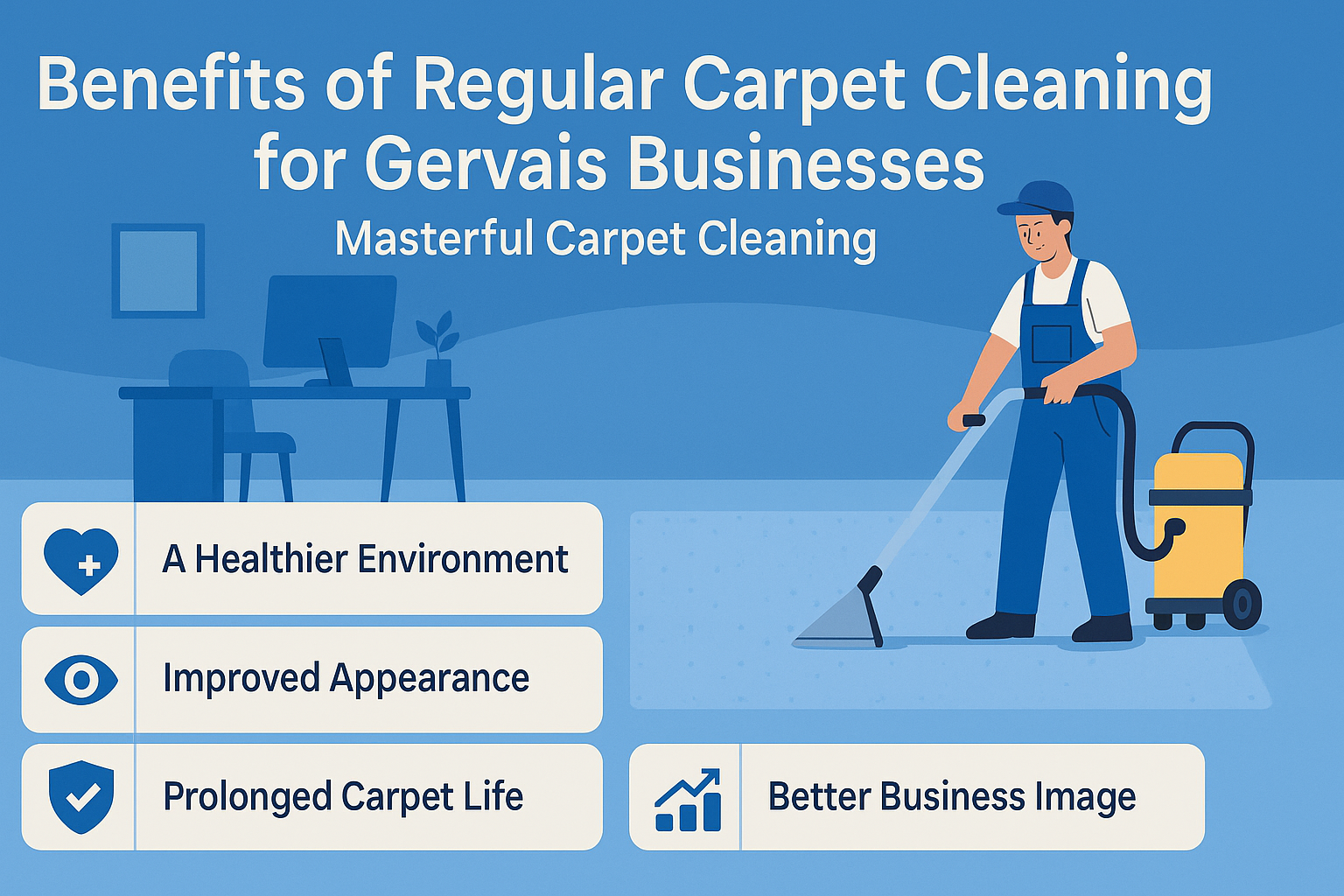Tile Cleaning: The Science Behind Cleaning Agents

Every time we reach for that bottle of tile cleaner, we’re employing the power of science to help us maintain the cleanliness and beauty of our homes.
But have you ever paused to wonder what exactly makes these cleaning agents tick? What’s happening on a molecular level?
Let’s, journey into the fascinating world of chemistry that underpins tile cleaning, exploring how various cleaning agents work their magic.

Tiles: A Closer Look
Tiles may appear smooth and impermeable, but if you could zoom in, you’d see a different story. Tiles, especially those made of natural stone, are porous materials.
This means they have minuscule pores or cavities that can trap dirt, grime, and bacteria. More often than not, these substances are oil-based, which makes them tough to remove with water alone.
Water and oil, as we know, don’t mix – a principle known as immiscibility. So how do we get around this? Enter, cleaning agents.
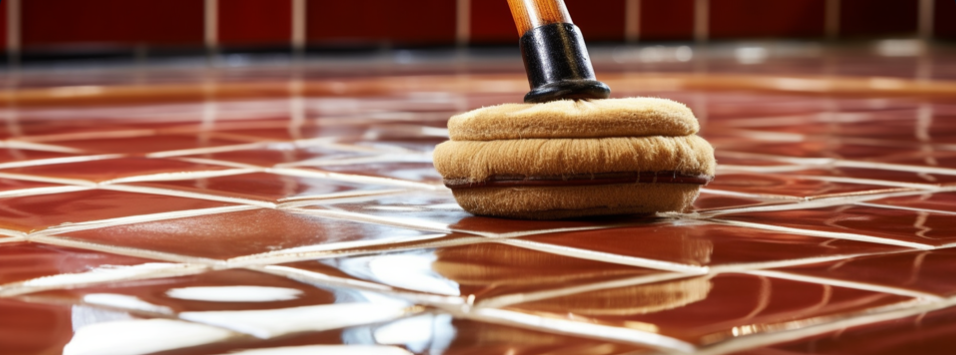
The Power of Cleaning Agents: Surfactants
Cleaning agents contain substances called surfactants (short for ‘surface-active agents’). These nifty molecules have the power to lower the surface tension between oil and water, allowing the two to mix.
This means that they can help water penetrate the oil-based grime trapped in your tiles, dislodging these particles and leaving your tiles squeaky clean.

A Closer Look at Surfactants
Surfactants are unique molecules with one end that loves water (hydrophilic) and another that loves oil (hydrophobic).
When you add a cleaning agent to water, these surfactants arrange themselves with their water-loving heads pointing towards the water and their oil-loving tails pointing away. This formation is known as a micelle.
When you apply the soapy water to a stain, the oil-loving tails of the surfactants in the micelles latch onto the oil particles in the grime, dislodging them from the tile surface.
The grime particles then get surrounded by surfactants, with the oil-loving tails pointing inwards towards the grime and the water-loving heads pointing outwards. These new micelles, now containing grime, can easily be rinsed away with water.
Practical example: Imagine you’ve spilled some cooking oil on your kitchen tiles. If you try to clean it up with water alone, you’ll find that the water just beads up and rolls off the oil.
But if you apply a surfactant-containing cleaning agent, the surfactants will surround and break up the oil particles, allowing them to be washed away with water.
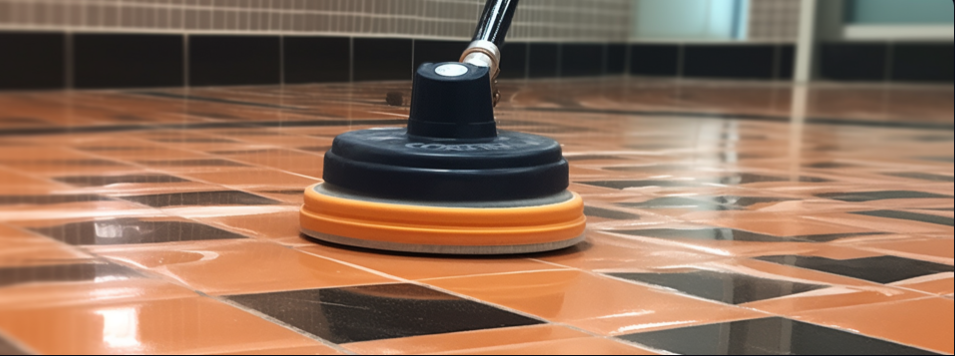
The Role of pH in Tile Cleaning
Cleaning agents can be acidic, neutral, or alkaline, each of which is effective against different types of dirt and stains. Acidic cleaners, for instance, are great for removing mineral deposits and soap scum, which are alkaline.
Alkaline cleaners, on the other hand, are effective against organic materials like fats, oils, and proteins. Neutral cleaners are safe for all surfaces but might not be as powerful against certain types of stains.
Practical example: If you notice a whitish film on your shower tiles, that’s likely soap scum, which is alkaline. An acidic cleaner will help dissolve this film, restoring your tiles to their original shine.

Specialty Cleaning Agents: Enzymes and Bleach
Some cleaning agents contain enzymes, which are proteins that can break down certain types of organic material. Enzyme-based cleaners are particularly effective against stains like blood, wine, and food spills.
Other cleaners contain bleach, which works by oxidizing and breaking down the molecules in stains. Bleach is a powerful disinfectant and can also brighten up discolored grout.
Practical example: If you’ve spilled red wine on your tile floor, an enzyme-based cleaner will help break down the wine molecules, making the stain easier to remove.

Choosing the Right Cleaning Agent
Choosing the right cleaning agent for your tiles involves considering the type of tile, the nature of the stain, and the pH of the cleaning agent.
For instance, acidic cleaners can damage certain types of stone tiles, while alkaline cleaners are best for tackling oil-based grime. Always remember to spot-test a new cleaning agent on a small, hidden area first to ensure it won’t damage your tiles.
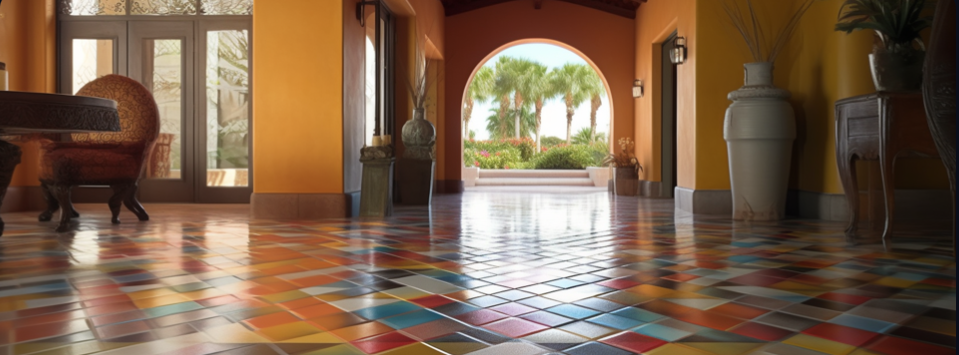
Safety Considerations
While tile cleaning agents are generally safe to use, it’s important to take certain precautions. Always read and follow the instructions on the product label.
Wear gloves to protect your skin, especially when using acidic or alkaline cleaners. Ensure the area is well-ventilated to avoid inhaling any fumes. And always keep cleaning agents out of the reach of children and pets.

Treat Your Tiles The Masterful Way
Now that you understand the science behind tile cleaning, isn’t it time to put that knowledge into practice? But don’t worry – you don’t have to do it alone.
With our professional tile cleaning services at Masterful Cleaning, we apply all these scientific principles and more to deliver the best results for your home or business.
Contact us today at (971) 600-6265 to schedule your professional tile cleaning service.
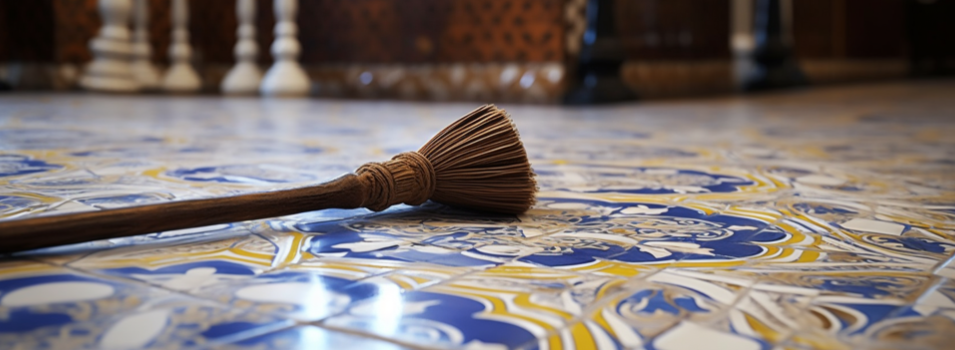
The Science Behind Professional Tile Cleaning
Just as we’ve discussed the science behind the cleaning agents you use at home, it’s worth exploring the science behind professional tile cleaning. Professional cleaners use advanced equipment and techniques to deliver results that are difficult to achieve with regular household cleaning agents and tools.
For instance, professional cleaners often use steam cleaning equipment, which uses the power of heat to break down grime. The high temperature of the steam not only dissolves stubborn dirt but also sanitizes the surfaces, killing bacteria, viruses, and mites.
Professional cleaning services have access to a wider range of cleaning agents and can choose the most effective one depending on the type of tile and the nature of the dirt or stain.
They also have the expertise to safely and effectively use these cleaning agents, ensuring your tiles get thoroughly cleaned without getting damaged.
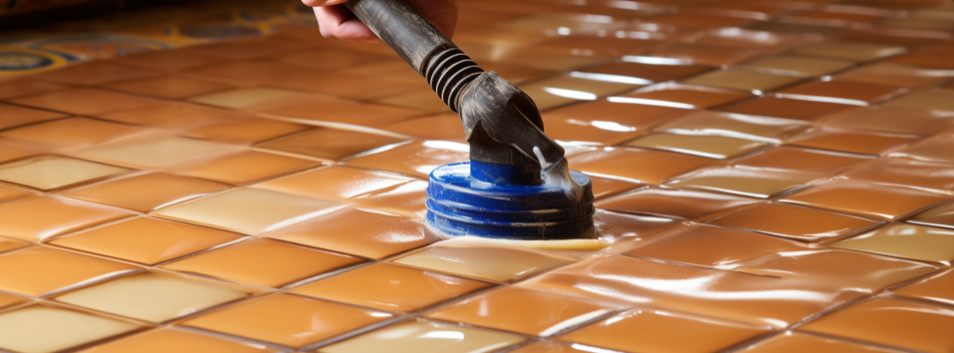
The Value of Regular Professional Tile Cleaning
Regular professional tile cleaning can prolong the lifespan of your tiles, keep them looking their best, and even contribute to a healthier living environment by removing bacteria and allergens.
While it may seem like an additional expense, the cost of professional cleaning can be offset by the savings in terms of avoided repair or replacement costs and the enjoyment of clean, beautiful living space.
And when you choose professional cleaning services, you’re not just paying for labor – you’re also benefiting from scientific expertise and advanced cleaning technology.
So the next time you look at your tiled surfaces, remember – there’s a whole world of science ready to help you keep them clean and beautiful.
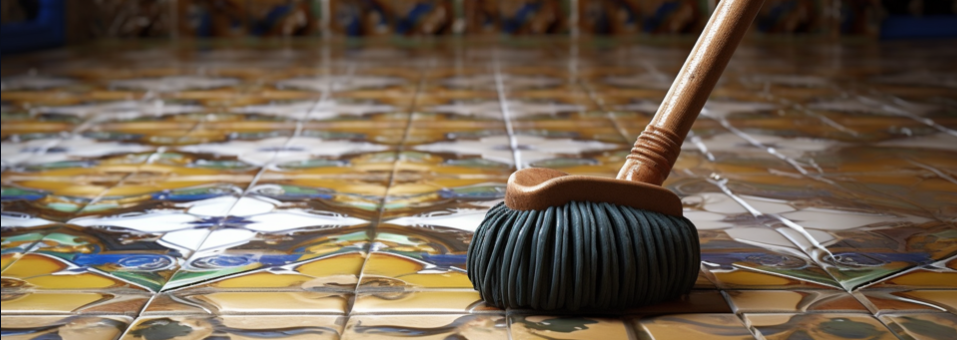
The Science Behind Grout Cleaning
The science behind tile cleaning wouldn’t be complete without mentioning grout cleaning. Grout, the mixture used to fill gaps between tiles, is porous and can easily absorb dirt, grime, and moisture.
This absorption can lead to discoloration and even mold growth, which not only looks unsightly but can also pose health risks. Cleaning grout often involves a more potent cleaning solution due to its porous nature and the stubbornness of the dirt it holds.
Bleach-based cleaners are often used due to their ability to penetrate the grout and break down mold and mildew. These potent cleaners should be used carefully as they can discolor the grout and damage the surrounding tiles if not used correctly.
Professional cleaners often use steam cleaners for grout cleaning, as the high temperature of the steam can effectively break down the grime without causing any harm to the grout or tiles.
They may also apply a grout sealant after cleaning, which forms a protective barrier over the grout, making it resistant to future staining and making cleaning easier.
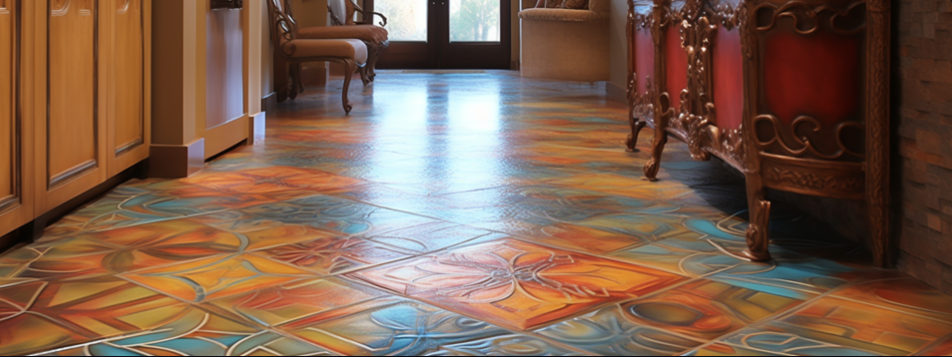
Environmental Considerations in Tile Cleaning
The science of tile cleaning also involves understanding the environmental impact of the cleaning agents used.
Many conventional cleaning products contain harsh chemicals that can be harmful to the environment when they’re washed down the drain. For instance, phosphates in detergents can cause water pollution, leading to harmful algal blooms in water bodies.
There’s a growing trend towards eco-friendly cleaning products that use biodegradable ingredients and avoid harmful substances. These eco-friendly cleaners can be just as effective as conventional ones, thanks to scientific advancements in formulating green cleaning agents.
Professional cleaning services like ours at Masterful Cleaning are also conscious of this environmental impact. We use eco-friendly cleaning agents wherever possible, and our cleaning processes are designed to minimize water and energy waste.
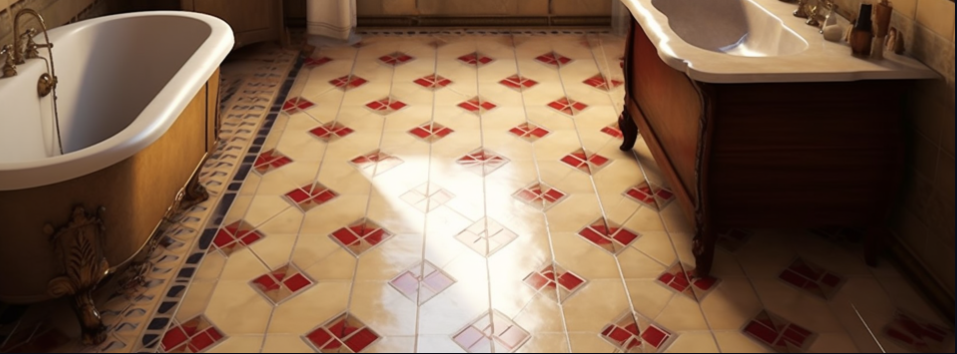
Future Innovations in Tile Cleaning
The future of tile cleaning lies in continuous scientific advancements. Researchers are developing new cleaning agents that are more effective, safer, and more environmentally friendly.
For example, there’s ongoing research into the use of nanoparticles in cleaning agents, which could enhance cleaning by allowing the agents to penetrate grime at a microscopic level.
Another area of innovation is in the development of self-cleaning tiles. These tiles are coated with a thin layer of titanium dioxide, which reacts with light to break down dirt and grime, essentially cleaning the tile without the need for any cleaning agents.

Complex and Fascinating
As we’ve explored, the science behind tile cleaning is complex and fascinating, involving chemistry, biology, environmental science, and even nanotechnology.
Understanding this science can help you make informed decisions about how to best maintain your tiled surfaces, whether you’re doing the cleaning yourself or hiring professionals. And with ongoing scientific advancements, the future of tile cleaning looks even more promising.

Understanding Your Tile Material and Cleaning Products
Tiles come in a variety of materials, including ceramic, porcelain, and stone, each with unique characteristics.
Ceramic and porcelain tiles are denser and more resistant to water and stains due to their low porosity. This makes them well-suited for areas with high moisture or potential for spills, such as bathrooms and kitchens.
On the other hand, stone tiles like marble and limestone are more porous and susceptible to staining. They can also be etched by acidic cleaners, which react with the calcium carbonate in the stone. Therefore, it’s crucial to choose a cleaning product that is suitable for your tile material.
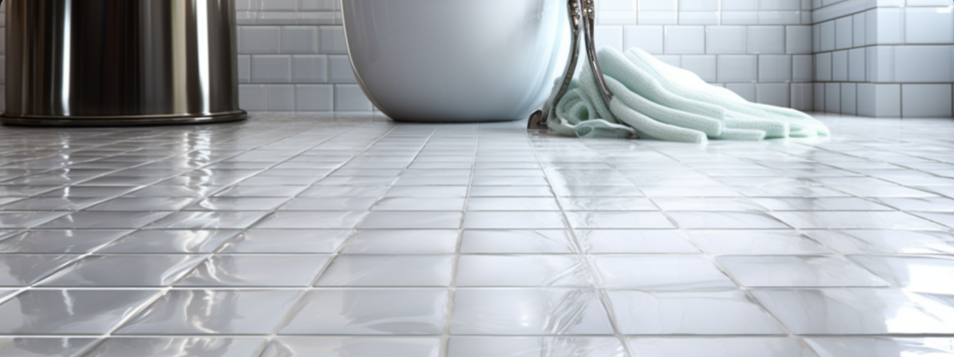
The Professional Advantage
When it comes to tile cleaning, hiring a professional service like Masterful Cleaning offers many advantages. These professionals understand the science behind tile cleaning, from the chemical reactions involved in removing grime to the physical processes that dislodge stubborn dirt.
They have access to specialized equipment, such as high-pressure steam cleaners, that can remove dirt and grime more effectively than conventional cleaning methods. Plus, they know how to apply sealants and protectants correctly to prolong the lifespan of your tiles and grout.
Professional cleaners can mitigate the risks of improper cleaning, which can cause permanent damage to your tiles. They know which cleaning agents are safe to use on each type of tile and how to use them properly to avoid causing discoloration, etching, or other types of damage.

Regular Maintenance for Long-lasting Tiles
Regular maintenance is key to keeping your tiles in top condition
This includes daily tasks such as sweeping or vacuuming to remove loose dirt and debris, wiping up spills promptly to prevent stains, and washing your tiles with a suitable cleaner regularly.
In addition to these routine tasks, it’s also beneficial to have your tiles and grout professionally cleaned at least once a year. This deep cleaning can remove dirt and grime that household cleaning can’t reach, and refresh the sealant on your tiles and grout for added protection.

Unmasking the Science of Clean
Understanding the science behind tile cleaning not only equips you with the knowledge to tackle your cleaning tasks more effectively but also underscores the value that professional cleaning services provide.
With their in-depth understanding of the chemistry of cleaning agents and the needs of different tile materials, they can ensure your tiles are cleaned thoroughly and safely.
Isn’t it time to treat your tiles to a professional clean?
Contact Masterful Cleaning today at (971) 600-6265 to schedule a service.
Author
-

As the Co-Owner of Masterful, Randy has been providing quality cleaning services to the Salem and Portland areas of Oregon for many years. He has built a reputation for excellence in the industry. His team take prides in using the latest cleaning techniques and technologies to deliver exceptional results every time.
View all posts
